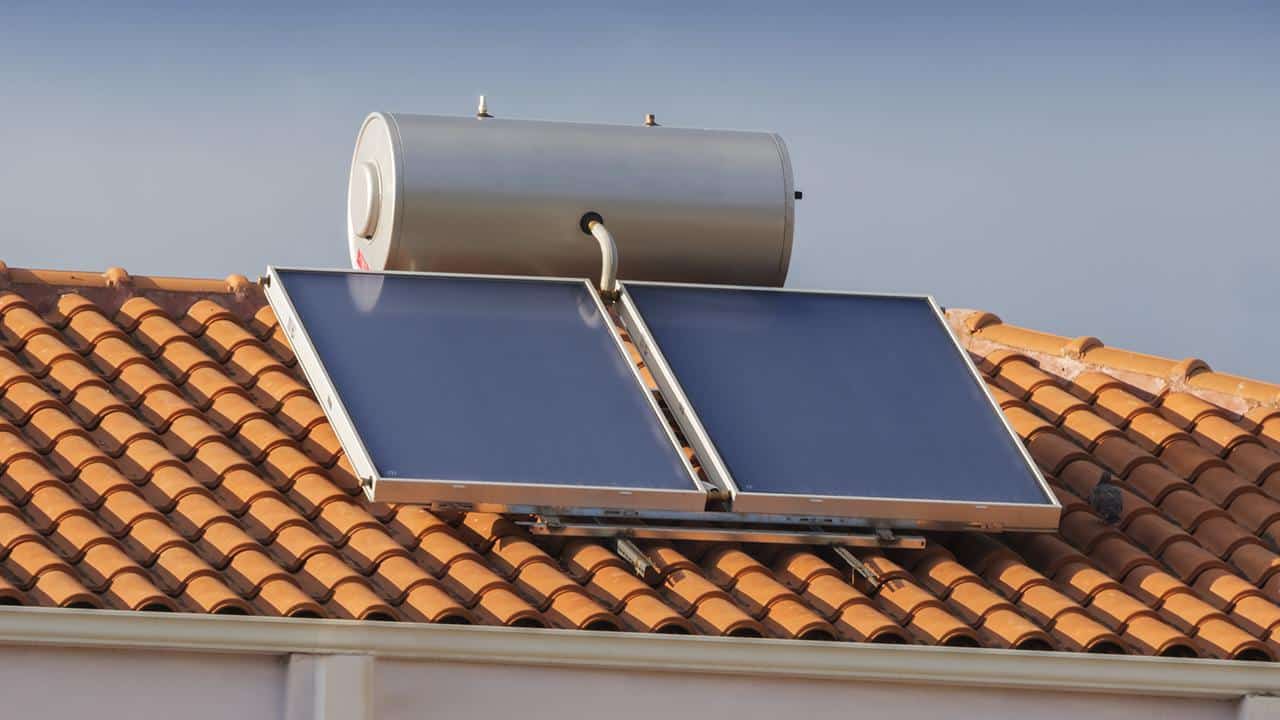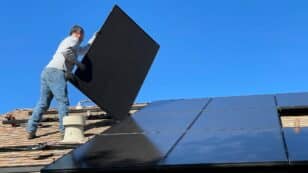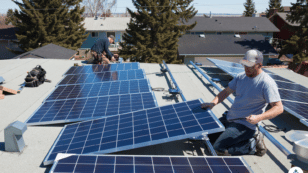

Solar Water Heaters Guide: 5 Key Aspects to Understand (2024 updated)
Each product and or company featured here has been independently selected by the writer. You can learn more about our review methodology here. If you make a purchase using the links included, we may earn commission.
While the upfront cost of a solar water heater may be higher than traditional water heaters, the solar energy you’ll harness can yield great savings and environmental benefits. Heating water accounts for 18% of a home’s energy use, but doing so with solar energy could cut your water heating bills by 50 to 80%.
In this article, we’ll explain how a solar-powered hot water heater can help you tap into a free, renewable energy source, potentially saving money and doing good for the planet. With this information, you can make the best decision about whether a solar water heater is a good investment for your home’s hot water needs.
To see how much a full home solar system would cost for your home, you can get a free, no-obligation quote from a top solar company in your area by filling out the form below.
Solar Water Heater Basics
A solar hot water heater’s basic function is to expose water or a heat-exchanging liquid to the sun’s rays, then circulate the warmed liquid back into your home for domestic use. The basic components of one are a storage tank and a collector to trap the sun’s heat.
Collectors are a series of flat plates, tubes or tanks through which water or a heat transfer fluid passes and absorbs the sun’s heat. From there, the fluid is circulated to either a water tank or heat exchange unit.
While solar water heaters are most commonly used as energy-saving devices to preheat water before entering a conventional water heater in the home, some warm and store water without the use of a conventional tank, offering totally sun-powered hot water.
Types of Solar Water Heaters
Solar hot water heaters are split into two broad categories: passive and active. The primary difference between the two is that active systems require circulating pumps to move water, and passive systems rely on gravity to move water. Active systems also require electricity to operate and may use antifreeze as a heat exchanger fluid.
In the simplest of passive solar collectors, water is heated in tubes, then piped directly to a faucet when needed. Active solar collectors either use antifreeze — which is passed from the solar collector into a heat exchanger that heats potable water for storage and household use — or just heat water directly, which is then pumped to a water tank.
Active and passive systems have subcategories that are specialized for various climates, tasks, capacities and budgets. The one that’s right for you will depend on factors including:
-
- Available space
-
- Availability of sunshine
-
- Your capacity requirements
-
- Building codes and regulations in your area
-
- Your installation budget
Let’s take a look at each type of solar hot water system and how it can benefit your home.

Blue Raven Solar

Regional Service
Average cost
Pros
- Industry-leading in-house financing
- Competitive pricing
- Excellent reputation
Cons
- Doesn't offer solar batteries (coming 2022)
Active Solar Water Heaters
Though more expensive than passive systems, active solar water heaters are more efficient. There are two types of active solar water heating systems:
Active Direct
In an active direct system, potable water passes directly through the heat collector and into a storage tank for use. They’re best suited for mild climates where temperatures rarely go below freezing.
Active Indirect
Active indirect systems circulate a non-freezing fluid through the solar collector and into a heat exchanger, where the fluid’s heat is transferred to potable water. The water is then circulated into a storage tank for domestic use. Active indirect systems are a must for cold climates where temperatures regularly dip below freezing. Without an active indirect system, pipes run the risk of freezing and bursting.
Passive Solar Water Heaters
Passive solar water heaters are the less expensive, simpler option but also tend to be less efficient than active systems. They can, however, be more reliable and last longer, so you shouldn’t overlook them as an option, especially if you’re on a budget.
All passive systems use pressure or gravity to circulate water, and come in two variations:
Integral Collector Storage and Batch Heaters
Integral collector storage (ICS) systems are the simplest of all solar water heating units — the heat collector also serves as the water storage tank. They’re quite efficient but only work in climates with little risk of freezing temperatures. ICS systems can be as simple as a large black tank or a series of smaller copper tubes fastened to a roof. ICS units with copper tubing heat faster due to the increased surface area but lose heat faster for the same reason.
ICS systems are usually used to preheat water for conventional heaters. In such a system, when water is needed, it leaves the storage tank/collector and enters a conventional water heater in the home.
An important thing to consider with an ICS system is size and weight: Because the storage tank itself is also the collector, they’re large and heavy. A structure must be strong enough to support bulky ICS systems, which may be impractical or impossible for some homes. Another drawback to an ICS system is its tendency to freeze and even burst in colder weather, making them suitable only for warmer climates or otherwise drained before cold weather hits.
Thermosyphon Water Heaters
Thermosyphon systems rely on thermal circulation. Water circulates when warm water rises and cool water descends. They feature a tank like an ICS unit but have collectors attached sloping downward from the tank to allow thermal circulation.
Thermosyphon collectors gather sunlight, sending heated water back to the tank via a closed-loop or heat pipe. While thermosyphons are more efficient than ICS systems, they can’t be used where regular freeing occurs.
How Much Does a Solar Hot Water Heater Cost?
The more hot water you use, the more likely a solar water heater will pay for itself over time. Solar hot water heaters are most cost-effective for households with many members or a large hot water demand.
A typical solar water heater will cost around $9,000 before federal incentives, with higher capacity active models reaching upwards of $13,000. Small systems may cost as low as $1,500.
Prices vary dramatically based on many factors, including the materials you choose, system size, installation and maintenance costs, and more. While ICS systems are the cheapest option (around $4,000 for 60-gallon units), they won’t work in all climates, so if your home sees regular temperatures below freezing, you’ll have no other choice than to fork over the cash for an active indirect system, or at least use a different system only part of the year.
Weight and size of cheaper passive systems might not be appropriate for everyone. If your structure won’t accommodate the weight of a passive system or you don’t have the room, a more expensive active system is yet again your best option.
If you’re building a new home or refinancing, you can roll the cost of a new solar hot water heater into your mortgage. Including the cost of a new one in a 30-year mortgage will cost you between $13 and $20 per month. Tack on federal incentives, and you might pay as little as $10 to $15 per month. So if you’re building new or refinancing, and your conventional water heating bills are over $10 to $15 per month, you’ll immediately start saving money. And the more water you use, the faster the system will pay for itself.
Aside from the cost to purchase and install the system itself, you’ll need to account for annual operating costs. In a simple passive system, this could be negligible or nothing. But in most systems utilizing conventional water heaters in tandem with a solar heater, you will bear some heating costs, albeit much lower than operating a conventional heater alone.
Tax Credits for Solar Water Heaters
You don’t have to shoulder the entire price of a new solar water heating system. Federal tax credits may significantly reduce the cost of installing one. Federal Residential Renewable Energy Tax Credits (also known as ITC, or Investment Tax Credits) can provide a 26 percent tax credit on solar water heaters. But there are some conditions to qualify:
-
- At least half of the energy generated from the property must come from the sun (photovoltaic systems).
-
- The new solar hot water heater must be certified by the Solar Rating and Certification Corporation (SRCC) or a similar entity endorsed by the government of the state in which the system is installed.
-
- The solar heating system can’t be used to heat swimming pools or hot tubs — it must heat water used within the home or business.
Many states, municipalities and utilities offer their own incentives and rebates for solar water heater installation. Check out the DSIRE database for more regulatory information.
Where to Get a Solar Water Heater
Solar hot water heater components are readily available in many national chain stores, such as Home Depot. Units are also available for purchase directly from producers, with Duda Diesel and Sunbank Solar offering several great residential options. Local installers may also offer quality units.
For solar pool heating and small-scale use, check out the heaters below:
-
- Duda Solar 30 Tube Water Heater Collector: This system is the perfect choice for heating pools, hot tubs and closed-loop systems. Thirty highly efficient unpressurized tubes provide excellent sunlight absorption and are rated at up to 45,000 BTUs a day.
-
- Sunbank Solar 40 Gallon Solar Water Heater: This is designed for households with one to three members. This thermosyphon system offers exceptional absorption efficiency (92-96%) and keeps hot water hot all day in an ultra-insulated built-in tank. Weighing in at just 180 pounds, it can be installed on most roofs.
-
- Duda Solar 200 Liter Water Heater Active Split System: This full kit comes with a stainless-steel water tank, controller and submersible water pump. It’s a dual-coil system, which allows you to heat the water in the tank both with solar power and a secondary electricity or heat source.
Because so many factors influence which solar water heater you should buy, it’s advisable to work with a professional when choosing and installing a larger solar water heating system.
Solar Hot Water Heaters Vs. Home Solar System
Solar water heaters are less common than they used to be. This is largely due to the drastic decline in the cost of solar panels, causing many people who would otherwise install solar water heaters to forgo them and heat their water with electricity generated from their own solar panels.
Solar water heaters take up precious real estate, and for a homeowner interested in producing their own solar-generated electricity, it may make more sense to maximize the space available and nix solar water heating altogether, buying solar panels instead.
However, if you don’t have the space for solar panels, solar water heaters may still be a great fit, as they take up far less room than solar panels do. Solar water heaters can also be a great option for those living in remote locations or as an environmentally friendly add-on for existing solar electricity generation. Modern electric water heaters are incredibly efficient and, when powered with solar electricity and paired with a solar water heater, will yield significant savings for your pocketbook and cut down your greenhouse gas emissions.
For many homeowners, the decision comes down to price. Solar hot water heaters can cost upwards of $13,000. To see how much a full home solar system would cost for your home, you can get a free, no-obligation quote from a top solar company in your area by filling out the form below.
FAQ: Solar Hot Water Heater
Whether a solar water heater is worth it all depends on where you live, your needs and preferences, and whether you plan on installing solar panels. They have been losing ground due largely to the surge of home solar: The folks that would install them also want solar for electricity generation and often choose to eliminate solar water heaters that compete for valuable rooftop space.
If you have the space, a solar water heater will likely lower your water heating bills. Used in tandem with other renewable energies, it is still a great choice for nearly any application.
A typical solar water heater system will cost around $9,000, with higher-end models reaching upwards of $13,000. Small-scale use heaters will be much cheaper, running between $1,000 and $3,000.
The biggest disadvantage of a solar water heater is that it won’t work on foggy, rainy or cloudy days, nor at night. While this can be overcome with a conventional auxiliary heater, it is still a disadvantage all solar technologies share. Maintenance can be another turn-off. While generally requiring little maintenance, some need regular draining, cleaning and protection against corrosion.
Solar water heaters circulate liquid through a solar collector — most commonly a flat-plate collector or tube collector — heating the liquid and sending it either to a tank for use or an exchanger, where the liquid is used to heat water for home use.
Christian Yonkers is a writer, photographer, filmmaker, and outdoor junkie obsessed with the intersectionality between people and planet. He partners with brands and organizations with social and environmental impact at their core, assisting them in telling stories that change the world.

 233k
233k  41k
41k  Subscribe
Subscribe 








